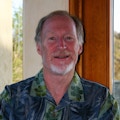David A. Caron, Ph.D.
Professor, Department of Biological Sciences, University of Southern CaliforniaDavid A. Caron’s website
SCOPE-ALOHA Project: Heterotrophic Protistan Biodiversity, Trophic Activities and Biogeochemistry at HOTS
Heterotrophic processes mediated by microbial eukaryotes (protists with heterotrophic or mixotrophic capabilities) remain poorly defined in our present understanding and modeling of oceanic ecosystems. These species are major consumers of phytoplankton and bacteria in marine food webs, and therefore fundamentally affect the pathways of nutrient and carbon flow, and energy utilization.
The overall species richness and composition of these assemblages, and how this biodiversity translates into ecosystem function, stability and resilience, remain important but largely unanswered questions. Additionally, the ecological roles and significance of a wide array of species that combine significant aspects of both photosynthetic and heterotrophic nutrition (mixotrophic protists) are particularly poorly characterized.
A central theme of this project will be observational and experimental studies to understand the trophic linkages between heterotrophic protists and their prey — bacteria and phytoplankton. This research will entail combined approaches of microscopy and genetic characterizations of the diversity of microbial eukaryotes at Station ALOHA. Field experiments will complement ongoing measurements at the site to describe and quantify the fate of prokaryote and eukaryote microbial biomass, aiding predictive models of individual behaviors of species, trophic structure and biogeochemical cycles.
Bio:
Dave Caron is a professor in the marine environmental biology section of the department of biological sciences at the University of Southern California, where he has served as section head, department chair, and as interim director of the Wrigley Institute for Environmental Studies. He has a B.S. in microbiology and an M.S. in oceanography from the University of Rhode Island, and a Ph.D. in biological oceanography conferred jointly by the Massachusetts Institute of Technology and Woods Hole Oceanographic Institution.
His research focuses on understanding the ecological and biogeochemical roles of phytoplankton and protozoa in marine and freshwater ecosystems. He has conducted studies in locations ranging from mountain lakes to major oceanic gyres, polar coastal sea and deep-sea hydrothermal vents. He is a recipient of the Mary Sears Endowed Chair for Excellence in Biological Oceanography (Woods Hole Oceanographic Institution), the Seymour H. Hutner Young Investigator Prize (Society of Protozoologists) and the Albert S. Raubenheimer Award for excellence in teaching, research and service (University of Southern California). He is a fellow of the American Association for the Advancement of Science and the American Academy of Microbiology.